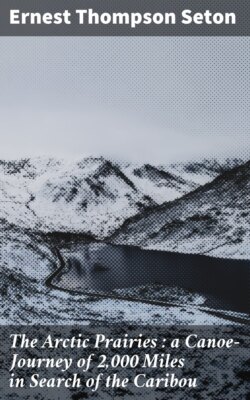Читать книгу The Arctic Prairies : a Canoe-Journey of 2,000 Miles in Search of the Caribou - Ernest Thompson Seton - Страница 15
На сайте Литреса книга снята с продажи.
OUT WITH SOUSI BEAULIEU
ОглавлениеIt's a, fine thing to get started, however late in the day, and though it was 3.20 P. M. before everything was ready, we gladly set out—Sousi, Major Jarvis, and myself—all mounted, the native leading a packhorse with provisions.
And now we had a chance to study our guide. A man's real history begins, of course, about twenty years before he is born. In the middle of the last century was a notorious old ruffian named Beaulieu. Montreal was too slow for him, so he invaded the north-west with a chosen crew of congenial spirits. His history can be got from any old resident of the north-west. I should not like to write it as it was told to me.
His alleged offspring are everywhere in the country, and most travellers on their return from this region, sound a note of warning: "Look out for every one of the name of Beaulieu. They are a queer lot." And now we had committed ourselves and our fortunes into the hands of Beaulieu's second or twenty-second son—I could not make sure which. He is a typical half-breed, of medium height, thin, swarthy, and very active, although he must be far past 60. Just how far is not known, whether 59 69 or 79, he himself seemed uncertain, but he knows there is a 9 in it. The women of Smith's Landing say 59, the men say 79 or 89.
He is clad in what might be the cast-off garments of a white tramp, except for his beaded moccasins. However sordid these people may be in other parts of their attire, I note that they always have some redeeming touch of color and beauty about the moccasins which cover their truly shapely feet. Sousi's rifle, a Winchester, also was clad in a native mode. An embroidered cover of moose leather protected it night and day, except when actually in use; of his weapons he took most scrupulous care. Unlike the founder of the family, Sousi has no children of his own. But he has reared a dozen waifs under prompting of his own kind heart. He is quite a character—does not drink or smoke, and I never heard him swear. This is not because he does not know how, for he is conversant with the vigor of all the five languages of the country, and the garment of his thought is like Joseph's coat—Ethnologically speaking, its breadth and substance are French, but it bears patches of English, with flowers and frills, strophes, and classical allusions of Cree and Chipewyan—the last being the language of his present "home circle."
There was one more peculiarity of our guide that struck me forcibly. He was forever considering his horse. Whenever the trail was very bad, and half of it was, Sousi dismounted and walked—the horse usually following freely, for the pair were close friends.
This, then, was the dark villain against whom we had been warned.
How he lived up to his reputation will be seen later.
After four hours' march through a level, swampy country, forested with black and white spruce, black and white poplar, birch, willow, and tamarack, we came to Salt River, a clear, beautiful stream, but of weak, salty brine.
Not far away in the woods was a sweet spring, and here we camped for the night. Close by, on a place recently burnt over, I found the nest of a Green-winged Teal. All cover was gone and the nest much singed, but the down had protected the 10 eggs. The old one fluttered off, played lame, and tried to lead me away. I covered up the eggs and an hour later found she had returned and resumed her post.
That night, as I sat by the fire musing, I went over my life when I was a boy in Manitoba, just too late to see the Buffalo, recalling how I used to lie in some old Buffalo wallow and peer out over the prairie through the fringe of spring anemones and long to see the big brown forms on the plains. Once in those days I got a sensation, for I did see them. They turned out to be a herd of common cattle, but still I got the thrill.
Now I was on a real Buffalo hunt, some twenty-five years too late. Will it come? Am I really to see the Wild Buffalo on its native plains? It is too good to be true; too much like tipping back the sands of time.
